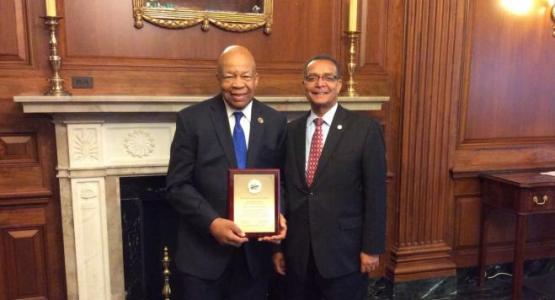
WAU President Reflects on Life of Elijah Cummings
Following the death of Elijah E. Cummings, a congressman from Maryland, Richard Castillo sat down with WAU President Weymouth Spence to hear his thoughts on the life and legacy of the U.S. House of Representatives for Maryland’s 7th Congressional District and honored civil rights leader. Cummings passed away October 17.
Richard Castillo: What aspect of Elijah Cummings life do you relate to?
Weymouth Spence: Elijah Cummings, like other leaders in the Civil Rights Movement came from meager beginnings. I feel as though I relate to their stories. I came to the United States from Jamaica and learned this country’s history. I learned about the struggle for equality, fairness and the struggle to get access to education. The non-violent aspect of civil disobedience has motivated me in a couple ways. One, learning how the fight for equality happened and how it has affected the country and my peers. Two, is how their struggle has given me opportunity by making the path smoother for me and the generations that will follow.
RC: Is there some inspirational aspect in seeing someone like Elijah Cummings rise in leadership and make great effect on those under his leadership?
WS: His example demonstrates a strong evidence that education is a pathway to success. It’s not necessarily about a degree. It’s about the education you gain from the influence of others. You must recognize that knowledge is power. It isn’t about being in a position, but knowing how to apply your education and wisdom the way that he did, and the way many civil rights leaders did. Many of them supported a strong educational pathway, whether from a skill level, a vocation, or higher education. I strongly believe that getting educated and surrounding yourself with people who have strong support for education, from early education through a college education, is a pathway to success.
RC: Elijah Cummings came from Baltimore, lived amongst the hardest hit citizens of inner city Baltimore and walked, arm-in-arm, singing with the people of Baltimore after the Freddy Grey death. How is that a motivator for you, as you are on the ground with your students, faculty and staff on a regular basis?
WS: It is strong evidence of effective leadership. Being among the people you lead. Jesus offered the example of always being in the community, with the people, having passion for the people. That’s what Elijah Cummings demonstrated and that’s what has influenced my style of leadership. I want to be among the students, playing with them on the softball field, at a recital or with our students at commencement. I want to pat them on the back when they are doing well and support them. I told one young man after a soccer game, “Don’t let them get in your head. You play your game. They’re gonna do what they do. You stay in control.” Being there, among the students has a strong influence as you exemplify good behavior.
RC: Elijah Cummings is well known recently because he started advocating for young children and many of those who are being disenfranchised. How do you perceive you role in advocating for your student’s rights and their futures?
WS: Being an advocate is trying to make sure that their goals are realistic to begin with. If a 4 foot tall student wants to play center for the New York Knicks, there needs to be a conversation. But if you are 4 ft tall and want to become a judge, a lawyer, preacher or teacher, those are things that can be accomplished. A great model of leadership I’ve learned from people like Elijah Cummings and his compatriots is just about being there to offer a level of support. I consider myself to be the barrier mover. I want to help move the obstacles that are challenging students and colleagues as they work hard to obtain their objectives. I want to use my leadership and influence to remove the barriers and smooth their pathway to success.
RC: What is something that you see in Elijah Cumming’s legacy that you would want reflected in your own?
WS: He was firm about fairness, integrity and honesty in his leadership style. He went out of his way recently as he led a committee in the House of Representatives, that provides oversight for the executive branch, to use his position wisely. He sought justice and used the system to obtain the fairness that we all expect as Americans. I’d like to make sure that every decision I make, has taken input from all aspects of the community and then allows me to make the right decision, even if it is unpopular. I believe the legacy of the decision will demonstrate that it was overall a tough decision, but the right decision.
RC: How are you taking the example of other black leaders in the community and making a difference in your own?
WS: President Obama and I started our presidencies at relatively the same time. I saw the positive and negative reactions to his leadership. His example inspired me to use my leadership to influence and help others to achieve their goals. Not to swing a heavy bat over people, but to use power for the disadvantaged. I want to use my influence to enhance the growth of people I serve; whether it’s students, parents, faculty, or staff. I believe when people succeed, institutions succeed. I believe family is the foundation of the world. The family becomes the society, the society becomes the country, the country becomes the world. These units are areas where we want our university to make a difference as we serve our communities, and fulfill our mission.
RC: What is one strong aspect of Elijah Cummings life that you would offer one of your students?
WS: Be level headed, do not retaliate evil for evil, but overcome evil with good.

Add new comment